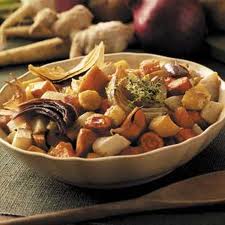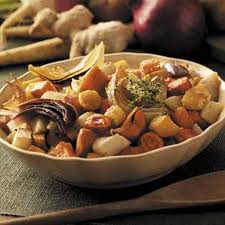 The organic food industry is huge. In 2011 sales of organic foods exceeded the $30 billion mark in the United States alone. What was once a small sub-section of America’s food culture has grown nearly 20% over the past 10 years and outpaces the sale of non-organic food by 2%-3% each year. These numbers are also echoed in most western countries around the world. The general consensus seems to be that eating organic food is good for you but is this sentiment true? Is eating organic food REALLY better for you than eating non-organic food? Also, what exactly makes a food “organic”?
The organic food industry is huge. In 2011 sales of organic foods exceeded the $30 billion mark in the United States alone. What was once a small sub-section of America’s food culture has grown nearly 20% over the past 10 years and outpaces the sale of non-organic food by 2%-3% each year. These numbers are also echoed in most western countries around the world. The general consensus seems to be that eating organic food is good for you but is this sentiment true? Is eating organic food REALLY better for you than eating non-organic food? Also, what exactly makes a food “organic”?
For starters, to get the USDA organic seal, foods need to have been grown, handled and processed by certified organic facilities. Meat, poultry, eggs and dairy products need to be produced from animals that have never been given antibiotics or hormones and who have been fed organic crop. Organic crops must be grown free of conventional pesticides, free of fertilizers made with synthetic ingredients or sewage sludge, and without bioengineering or use of ionizing radiation.
The USDA is careful to note than an organic seal does not mean that a food is healthier or safer than its conventionally grown equivalent. In fact, a 2010 review looking at studies of organic foods and health benefits over the past 50 years determined that there’s not enough good data to say one way or the other if organic foods are healthier. Of the studies that had been done, the only one that found a health difference showed that the risk of eczema was decreased in infants who ate strictly organic dairy products. Overall, there just isn’t enough good information to determine the benefits.
That being said, there is some tangential data that does seem to support the benefits of organic food. A study of preschool children in Seattle found that kids who ate conventional diets had significantly higher levels of urine pesticides than the kids who ate organic. Truthfully, Higher urine pesticides haven’t been connected to real health outcomes but it seems like a good idea to minimize consumption of toxic chemicals.
Even though we don’t have any conclusive proof that eating organic is better for you, when it comes to fruits and vegetables, we know which fruits and vegetables use more pesticides and which use less. Here is a list of fruits and vegetables, which according to the Environmental Working Group have more pesticides
- Celery
- Peaches
- Strawberries
- Apples
- Blueberries
- Nectarines
- Sweet Bell Pepper
- Spinach
- Kale/Collard Greens
- Cherries
- Potatoes
- Grapes
The same groups say that the following list uses the least amount of pesticide:
- Onions
- Avocado
- Sweet Corn (Frozen)
- Pineapples
- Mango
- Sweet Peas (Frozen)
- Asparagus
- Kiwi Fruit
- Cabbage
- Eggplant
- Cantaloupe
- Watermelon
- Grapefruit
- Sweet Potatoes
- Honeydew Melon
When it comes to organic meat, the criteria are different. Organic livestock is raised in a more humane, more sanitary way and the production of organic meat has less of an impact on the environment than traditional meat production. Here are just a few of the other differences between organic and non-organic meat.
In order to stimulate growth and prevent the spread of disease, non-organic cattle and livestock are given antibiotics and growth hormones. These hormones can remain in the manure of the animals and lead to the contamination of groundwater. Organic animals, on the other hand, are not given any hormones, antibiotics or growth stimulants. Instead, farmers use a well-rounded diet of organic materials to promote growth and fight off infection in their livestock.
It is common for non-organic farmers to feed cattle ground up cattle and animal remnants to encourage growth. This practice can cause diseases such as bovine spongiform encephalopathy also known as mad cow disease. Organic farming prohibits the practice of feeding animal remains to herbivores and safeguards against this dangerous infection.
Traditional farms use a variety of pesticides and chemicals to encourage the growth of their crops and ward off insects. Animal are exposed to these chemicals when they graze on the land. Organic farms use natural materials to promote crop growth. Therefore, by purchasing organic meat, you can decrease your exposure to harmful chemicals and toxins.
Factory farms seek to produce as much meat as possible for a minimal cost. The emphasis on product and profit means that the animals are subject to inhumane conditions. Animals are crammed into barns and crates and given little access to the outdoors. Organic animals spend less time confined indoors and are given plenty of time and room to graze.
Industrial farms raise so many animals and produce so much manure that the excess often contaminates the earth. The overflow of manure can infect wells and other areas with E. coli and other harmful chemicals. Organic farms raise less livestock and produce just enough manure to rejuvenate and fertilize the soil. Also, because organic animals are fed organic diets, their manure is pure and free from any toxins.
Organic meat may not contain more nutrients or fewer calories than meat produced by a traditional factory farm. However, proponents of eating organic say it contains fewer toxins and is better for the body and the planet.
In weighing the pros and cons of going organic or not, the jury is still out and right now, the cost versus the benefit may not be worth it. Organic or not, eating a well rounded diet full of fresh produce, whole grains, and lean proteins is essential for good health and will “add hours to your day, days to your year, and years to your life.”
Want to live an organic life? Check out Confessions of a Kosher Organic Junkie in Jewish Action!
Alan Freishtat is an A.C.E. CERTIFIED PERSONAL TRAINER and a BEHAVIORAL CHANGE and WELLNESS COACH with over 19 years of professional experience. Alan is the creator and director of the “10 Weeks to Health” program for weight loss. He is available for private coaching sessions, consultations, assessments and personalized workout programs both in his office and by telephone and skype. Alan also lectures and gives seminars and workshops. He can be reached at 02-651-8502 or 050-555-7175, or by email at alan@alanfitness.com Check out the his web site –www.alanfitness.com US Line: 516-568-5027.
The words of this author reflect his/her own opinions and do not necessarily represent the official position of the Orthodox Union.


